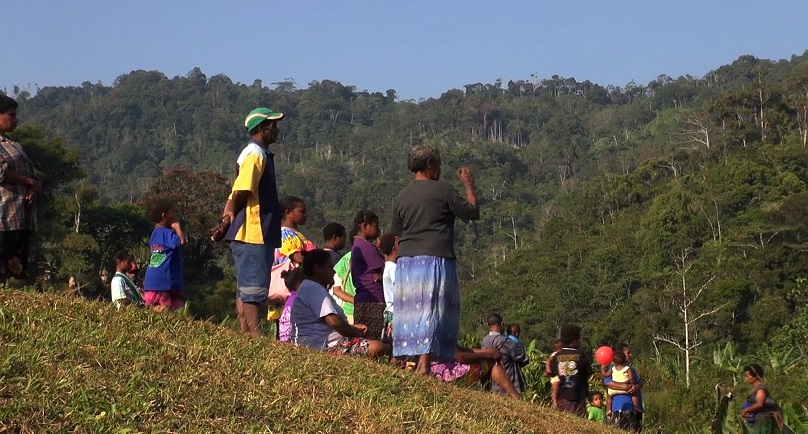By Tokana Hasavi Jnr – EMTV, Port Moresby
A road that ensures access to service delivery is what the people of Menari, in the Kairuku-Hiri electorate of Central Province, desperately need.
Menari has a population of just over 1,000 people, an extremely remote area within the Koiari LLG. 32 kilometres away from the CBD of Port Moresby, its location is nestled by the mountains that surround the historical Kokoda Track.
Despite having an airstrip, service delivery via air transport is uncommon, and if used, very expensive.
Isolated with no road and insufficient service delivery, Menari’s hardships are made even worse by the impact of the recent extreme dry weather conditions.
It takes about 20 minutes on a chartered plane to get to Menari Village from Port Moresby.
The majestic views from Menari captivate you from the get-go, but when you learn of the harsh realities of this village, the resilience of the Menari people will captivate you even more.
Alecks Wageri, a head teacher at Menari Adventist Primary School, has been teaching for about 30 years.
Accessing Wageri takes an arduous two-day walk to Port Moresby just to deliver the school’s report to the Education Department; yet his passion for education is undeniable.
He’s been walking for almost two decades.
“It takes me two days to reach Port Moresby, sometimes three days depending on the weather. A chartered flight costs the community K5000 – its money we don’t have, so I need to walk to deliver my school’s reports, which is a requirement from the education department,” said Wageri.
Wageri and his band of five teachers share the role of teaching elementary to grade eight students, over 120 of them.
“One teacher takes the elementary grades while one teacher take grade eight, another takes seven and six, grades five and four are taken by the other, while I take grade three and tend to administration duties,” he explains.
There is no phone coverage in Menari which makes mobiles irrelevant. You would have to walk about an hour to find a relatively suitable area to receive mobile coverage.
Kokoda Track rangers with the Kokoda Track Authority provide the only reliable source of communication, through two-way radios.
Kairuku-Hiri MP, Peter Isoaimo, says there are conflicting views about the prospect of a road, with critics saying it would affect the income that villages make from the Kokoda Track.
“The surrounding villages say they would rather have air transport as travel means,” Isoaimo said.
Their water supply for the town comes from a river catchment nearby.
But lately, water has been not been running, as indicated by their health clinic.
Food gardens and their harvest are either low or damaged, and the water supply is low – effects that are synonymous with other impacted areas in Papua New Guinea.
Isoaimo says an assessment team will be dispatched and relief aid will be rolled out after concrete reports are gathered.
Isolated with no road, affected by extreme dry weather and with rations already declining, Wageri predicts the worse.
“People in the village are having one meal a day – if this continues, we may suffer severe consequences if the drought continues,” says Wageri.
The perseverance of Alecks Wageri shows the resilience of this community, and despite their brutal hardships, the smiles from Menari reinforce that resilience.
He continues to work and walk the 32 kilometre trek over two days to reach Port Moresby to deliver his school’s reports.
With damaged food gardens, water running low and no road to ensure basic service delivery, the resilience of the Menari people will truly be tested, as the current dry spell continues.


